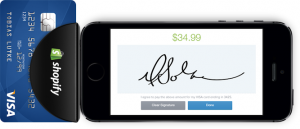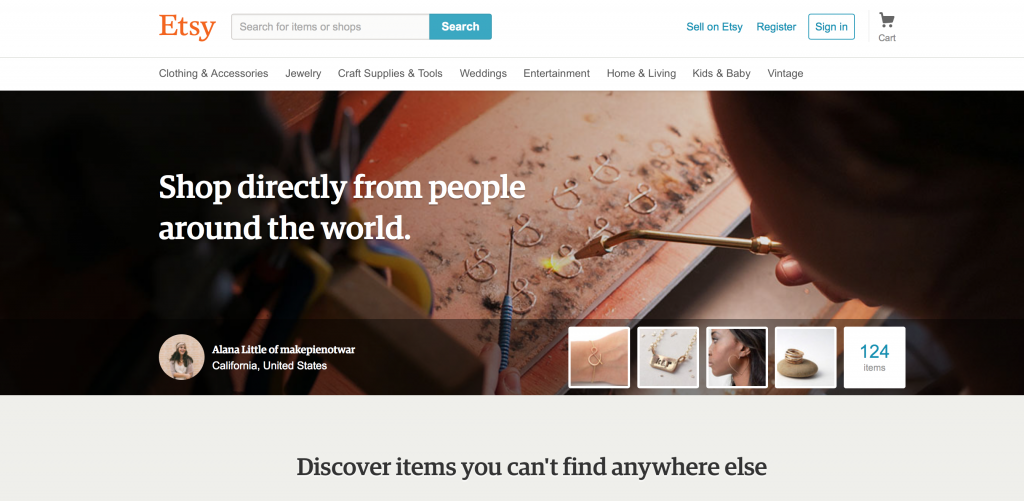We wanted to walk you through the different options of selling your DIY projects online. We do have insight into this considering we have sold on varying platforms from Etsy to Shopify to Bigcommerce and more. Which is best though? What will work best for your business? Let's dive in and take a closer look!
Shopify and Bigcommerce offer something completely different than Etsy. With Shopify and Bigcommerce, before you can start selling your DIY projects online, you'll need to get a domain name and hosting service (I highly recommend Bluehost and will tell you why, later). With Etsy, the traffic for people shopping for handmade goods is already there, you simply open a Shop and start listing products for sale – there is plenty of competition though. All three of the sites started small, found a void in the market, and continue to grow and succeed.
Shopify started in 2006, “Nearly a decade ago we started an online store to sell snowboard equipment directly to those who loved the sport as much as us.We could have listed our products on a number of marketplaces, but we wanted to own our brand and build relationships with our customers, along with selling our goods. Such a tool didn’t exist, so we built it for ourselves. We soon realized a number of other stores were in need of a hassle-free platform to build their retail business, and Shopify was born.”
Etsy was founded with a DIY and handmade attitude in Brooklyn, NY. “Etsy was founded in June 2005 in an apartment in Brooklyn, New York to fill a need for an online community where crafters, artists and makers could sell their handmade and vintage goods and craft supplies. In the spirit of handmade, founder Rob Kalin and two friends designed the first site, wrote the code, assembled the servers and spliced the cables to get Etsy up and running.”
Bigcommerce, too, started small and spiraled from there. “Bigcommerce was founded in 2009 by Australians Eddie Machaalani and Mitchell Harper following a chance meeting in an online chatroom in 2003. In August 2009, the two relaunched a hosted version of Interspire Shopping Cart called “BigCommerce” and opened its first U.S. office.”
Pricing and Fees
Etsy…
is a great place to start selling your DIY projects. It offers you a chance to “test the waters” before diving into the hosting, management, and service of your own domain commerce site. Etsy's fees are as follows: “you will be billed a listing fee of $0.20 USD for each item that you list for sale on Etsy’s website or mobile apps. When you make a sale through Etsy, you will be charged a transaction fee of 3.5% of the item price”. Click here to open shop and start selling on Etsy today!
Shopify…
is another great place to start selling your DIY projects and with a little more SEO, marketing, and management work, you'll have your own store specifically selling your goods. Shopify does offer a 14 day free trial period for you to test things out before committing! Shopify has a few different pricing options, with each tier offering more than the last, it goes as follows: $29/month Basic Plan giving you full capability to sell an unlimited amount your products, there is a 2.9% + 30¢ transaction fee for every sale as well. $79/month Pro Plan stepping you up to the next level with lower transaction fees and other features. 2.6% + 30¢ transaction fee with the Pro Plan, added ability to offer/accept Gift Cards and more. Click here to open your own store and start selling through Shopify today!
Bigcommerce…
is yet another great place to start selling your DIY projects, with features and functions similar to that of Shopifys. Bigcommerce does offer a 15 day free trial period before you commit to a monthly plan. Their plans are as follows: $29.95/month Standard Plan with unlimited storage, bandwidth, and product listings. This plan hosts a low 1.5% transaction fee as well. Their next jump up is the $79.95/month Plus Plan. Besides checkout now being hosted completely on your domain and abandoned cart recovery opportunities, the best feature of this plan is the NO transaction fee associated with it. They do have plans beyond this as well. Click here to open your store through Bigcommerce today.
Design and User Interface
Etsy is really a great marketplace for those trying to market and sell their handmade goods. Their site is easily navigable, has a clean design, and showcases your product. The listing of your DIY projects on Etsy is pretty seamless: you set a title, description, price, shipping, add photos, and list! As mentioned before, Etsy has a wealth of other sellers that will be shown directly next to your product, so the competition is high. The advantage of having your own domain and site through Shopify, Bigcommerce, or another platform is that its all about what you're posting, no direct competition on your site.
Etsy divides your products into different categories and the main category page such as “Furniture”, shown above, is an excellent example of the competition aspect of Etsy. In the furniture category alone, there are 133,894 items as of October 1st, 2015. You can pay to promote your item and if you'll notice above, the first three listing in the middle of the page are Ads. You can set your daily limit anywhere from $1.00 to $10.00 a day to get more impressions, views, and clicks on your products.
Something that Etsy currently offers is free Google Shopping listings of your products. This means when somebody Googles “handmade pallet coffee table”, given that you have set the right keywords in your listing and have added relevant tags to this, your listing will appear to purchase right through Google. I expect that they may drop this feature in the future, as the bill has got to be adding up for them, even though they are making a fair share from transaction fees.
Both Shopify and Bigcommerce offer complete customization of your own website, once hosted through someone like Bluehost. Above is an example of some of the themes you can pick from. As far as listing items go, both platforms offer fairly seamless processes of titling, describing, and posting your products for sale. Both of these companies offer powerful SEO tools ranking you higher in Google and search engines. I would say that Bigcommerce has better SEO and Marketing capabilities than Shopify though. With Bigcommerce, you can directly add your items to Google Shopping in the backend management of your site. There are pros and cons to both, but the usability and ease of listing items remains similar.
Sell In Person

One thing that Shopify and Etsy do offer that Bigcommerce does not is the ability to sell in person either with a POS system for your retail storefront or with simple card readers that attach to smartphones/tablets. Selling your DIY projects in person is a valuable method for those attending craft fairs, markets, etc.
![]()
Etsy's Sell in Person card reader is a great piece of equipment for anyone trying to sell their products. Let's look at some of the features and fees associated with it. Through the free “Sell on Etsy” app and the card reader that plugs into any 3.5mm audio jack, you're able to securely accept credit card payments that will then directly deposit into the bank account you set up. For swiped transactions there is a 2.75% of sale transaction fee. For manually, keyed-in transactions there is a 3% of sale + $0.25 transaction fee. These are the only fees you'll see associated with selling in person. Stated on their policy page, “In-person sales are not subject to Etsy’s standard 3.5% marketplace transaction fee”.

Shopify also offers a sell in person option via a credit card reader, as well as offering a full blown point of sales kit with register. The retail package add on is $40/month and is designated for bustling, busy retail stores. The nice thing about their credit card processing fees is that it is the exact same that you typically pay with your plan's fees. You'll always know the exact amount and could then consider upping your plan to lower the fees when the time is right.
Hosting
If you're thinking you want to go the Shopify or Bigcommerce route over Etsy, then you'll want to have your own domain and domain hosting service. As mentioned earlier, I recommend Bluehost for this.
Bluehost is the hosting service I use for 100% of the websites I create. This includes both DIYPETE.com and ThinkEntrepreneurship.com. They have a 1 click WordPress integration which makes it so easy to start a website or a blog. Their pricing is very affordable. You do pay for one year at a time in advance, so be aware of that upon checkout. Click here to set up website hosting with Bluehost!
Managing Your Business
A great feature to add to your business is a phone service. Not only does a phone service help separate your personal and business calls, it adds credibility to your business, and portrays a larger company size. Grasshopper virtual phone service offers a phone system for businesses. Here is a short 2 minute video explaining there service!
I do use Grasshopper and love what it has to offer. Easy forwarding from an 800 number to my personal phone, voicemail transcribing, extensions, and much more. The pricing for Grasshopper is very fair, as well. Click here to sign up for Grasshopper today!
Get Social with It
We strongly believe that it's important that, while getting established and once established, you promote your products via social media. Creating a Facebook Page, Instagram account, Twitter, and more are great ways to get interaction, direct people to certain pages or products, and create a buzz behind your offerings. Don't underestimate the power of social media and how it will help you in selling your DIY projects. You'll spend time in the beginning following people and like-interests, spreading the word, and creating the following. It's worth the time writing, posting, and sharing via social media.
–
We wanted to walk you through the different options of selling your DIY projects online. Hopefully this blog post has given you insight into the varying platforms where you can start selling today! If you have any questions feel free to comment below or contact directly. I wish you the best of luck in all of your ventures! Cheers







